People sometimes ask me why I travel, and how I choose where I travel to. Let me give a recent example.
I have recently been making an effort to fill in gaps in my knowledge of modern European history. In particular, I have been attempting to learn about the Napoleonic Wars, and the subsequent growth of Prussia and its evolution into the German empire. The remnants of Europe’s 20th century history are obvious and everywhere, but the remnants of earlier upheavals are equally there if you look for them. I have a certain penchant for looking at odd and peculiar remnants of the past, sometimes big, sometimes small. When in Poland late last year, for instance, I found myself visiting the remains of the mausoleum of Prussian General Gebhard Leberecht von Blücher, victor alongside the Duke of Wellington at the Battle of Waterloo. This was desecrated by the Red Army in the closing days of the Second World War – Russian soldiers used the general’s skull for a game of football when doing so – and is not particularly easy to find these days, as Poland does not exactly advertise its presence, but it is there if you look for it.
And when reading about those same wars, I discovered an interesting fact: that there is an outstanding territorial dispute between Spain and Portugal from the same era. The river Guadiana forms the approximate border between Spain and Southern Portugal, although there are significant pieces of land that are east of the river and nonetheless part of Portugal. There used to be more. The town of Olivenza (in Spanish) / Olivença (in Portuguese) was Portuguese from the thirteenth century until the nineteenth (full details here). However, as Portugal allied itself with England in 1373 and the Spanish kingdoms were more often allied with France or other continental European powers, European wars along with local rivalries meant that the border was often fortified and there were various military skirmishes in the area over the centuries. For instance, the Ajuda Bridge across the Guadiana (which like many bridges in rural Portugal is often claimed to be Roman but which was actually built in the 16th century) connecting Olivença to the nearby Portuguese town of Elvas, was destroyed in 1709 during the War of Spanish Succession. Lack of resources, continuing instability, and the devastating earthquake of 1755 prevented it from being rebuilt before Olivença fell to the Spanish in the War of the Oranges in 1801, and was ceded to Spain in the Treaty of Badajoz that same year.
One article of that treaty stated that if either side breached any article of the treaty, the whole treaty was void. Spain and Portugal went to war again in the Peninsular War of 1807, at which point Portugal claimed that the Treaty of Badajoz had been abrogated as a consequence. Upon the final defeat of Napoleon, Britain promised to aid Portugal in achieving the return of Olivença, and a clause was inserted in the Treaty of Vienna in which it was agreed that the powers would “endeavour with the mightiest conciliatory effort to return Olivenza to Portuguese authority”. After a bit of foot dragging, Spain signed the treaty.
And that is where we are today. Spain occupies Olivenza to this day, stating that agreeing to “endeavour with the mightiest conciliatory effort” is not the same as agreeing to do something, and claiming that the Treaty of Badajoz is still valid. Portugal rolls its eyes at this, and states that the Peninsular War makes the Treaty of Badajoz null and void anyway, plus Spain agreed to give Olivença back under the treaty of Vienna. The Napoleonic wars apparently continue on this small corner of the Iberian Peninsula, just as the Franco-Prussian War apparently still goes on in Liechtenstein. In practice, nobody gets too worked up about this, as modern relations between the two countries are good.
Before Christmas, I learned all this and I thought it was kind of interesting. In addition I was able to get a very cheap airfare to Faro on the Algarve and a cheap car rental when I arrived there. Plus the forecast in London was for heavy snow, and I wanted to get out of the cold for a few days. Plus I always have a lovely time when I go to Portugal – especially when I drive into the interior. There is a certain cliche of rural France (much represented in French cinema and much parodied in Stella Artois commercials) that seems largely gone when one visits rural France. One still finds it rather more in rural Portugal, and I find this rather charming.
So, the plan was set. I would fly in, have a look at the coast, and drive up the Portuguese side of the border, roughly following the Guadiana river, ultimately ending up at Olivenza. I would look for lingering signs of Portugueseness and resentment from the Napoleonic wars. If I had time, I might then head for the coast near Lisbon, look for the location used in a music video of a song by a Romanian pop princess that I had viewed in a bar in Transylvania a couple of weeks earlier, for no particular reason other than it reminded me a little of home. The drive along the Algarve coast was quite pleasant. I had a fine cataplana in Olhão, spent some time in the beautiful Roman (and before that Phoenician) town of Tavira (where the bridge that is claimed to be Roman but was actually built by the Moors).
I spent the evening in the (post-1755) frontier town of Vila Real de Santo António, where I had one of the 365 kinds of Bacalhau a Bras and spent a little time sitting beside the Guadiana as I had a coffee and a glass or two of vinho tinto. On the way, I drove past a lot of golf courses and beachside cafes that were mostly or entirely closed for the winter. I find the deserted quality of the Spanish and Portuguese resorts at this time of year to be a touch puzzling, given that the weather is pleasant at a time when the weather in England, Germany and Scandinavia is hideous, and a few days south is a nice way to prevent oneself from committing suicide due to the winter. But so it was. The expatriates were there in the towns, and many had friends visiting them from the UK. The local economy is clearly geared up to English visitors, and there were plenty of expatriates to talk to, despite the more seasonal resorts being so empty. So I spent the evening chatting to people who were also escaping the English and Scottish weather.
The next morning it was time to head north. The weather was terrible. Rain was pouring down, but it was not too cold.
Portugal has long been the poorest country in western Europe, and it is easy and lazy to see it and describe it as relatively backwards: I probably did this myself when I earlier described it as fulfilling a certain rural cliche. I could say the same thing and just describe the country as having urbanised late. And of course I will mention the date of 1755 one more time: one still senses that the country’s history is divided into before and after the earthquake, and much of the country took decades if not centuries to recover from that.
Of course, though, the Mediterranean was the heart of civilization for millennia. This area of Europe was occupied or traded with every civilization for thousands of years Everything is here: Phoenicia, Carthage, Rome, the Visigoths, the Moors, and then various Spanish and Portuguese kingdoms. The river Guadiana was important: it was navigable a fair way inland, and formed a natural border.
The obvious consequence, or at least the obvious consequence once you see it, is that the river is a route of extraordinary history and interest. I drove inland to Alcoutim, where I sat in a restaurant and ate pork with rice and potatoes, and watched the rain fall down outside, Through it I saw a castle on the hill looking across the river towards another castle on a hill on the Spanish side. I thien drove to Mertola, the furthest point up the river that could be reached in antiquity by ocean going ships. There my plans to get to Olivenza that evening went astray, for Mertola is a magnificent site. A medieval castle on the hill. A building of worship that is now a church but at various times also managed to be a synagogue and a mosque. An archaeological dig showing amazing Roman ruins, including those of a beautiful portico, no doubt a very painful spot. Some of the finest Islamic art to be found in Portugal. I couldn’t help myself. Despite the horrible weather I went from site to site and museum to museum, expressing my intense enthusiasm as to the magnificence of the place to the staff in charge of the various sites.
It was a cold, rainy, winter’s day. There were few people visiting this day. The news that there was an intensely enthusiastic Australian touring the various sites and museums managed to get around faster than I did, and thus I was greeted warmly and with expectation at the latter sites. One of the curators lent me an umbrella. Everyone was really nice.
After spending most of the afternoon in Mertola (and really, the place is worth far more than an afternoon) there was no chance I would make Olivenza that evening. And really, that was okay. I decided to drive a little further and find somewhere where I could stop for the night. I drove for another hour or so, and eventually got to Serpa. Like every town in this part of the world, Serpa has ancient city walls, a magnificent castle and the ruins of a spectacular aqueduct. (The aqueduct was what I chose for the Portuguese part of this trip for my end of year place dropping post). The locals were clearly very proud of these things, as they were lit up as I drove into town. By this point I was tired, and the rain showed no sign of ceasing. I needed to find somewhere to sleep, and I needed a nice meal.
Finding a comfortable and inexpensive residencial was not particularly hard. (One of the nice things about both Spain and Portugal is the huge amount of inexpensive, simple, and comfortable accommodation). I found a restaurant. The family who owned this restaurant spoke no English whatsoever, which led to much gesticulating, loud discussion and assorted other commotion when I showed up, but this in this part of the world this is simply how they convey welcome. Once I communicated the fact that I needed food, and that a little wine would possibly go well with it, I was well looked after. A large plate of pork with potatoes and rice was provided, along with a half litre of red wine that must have come from a vineyard no more than a couple of miles away.
The lack of obvious preparation for tourists emphasized a particular point. Although a huge number of foreigners visit the beaches of the Algarve, the inland of Portugal is off the international tourist trail. I find this puzzling, as this is wonderful country, and the reception one receives in it is as warm and welcoming as I have ever found anywhere.
The next day was dry and sunny. I continued driving north, through dry and harsh country. Despite its cultural and historical magnificence, the Alentejo region of Portugal is among the harshest and poorest regions of the country. Copper mining was important in this region for much of the early 20th century, which compensated for the relative decline of agriculture, but that is now gone. I drove through the small town of Pias. There was no bypass here. Odd historical circumstances mean that Portuguese roads tend to consist of narrow single carriageways or four lane motorways – there is little middle ground. The main road turned into a narrow street going through the centre of town. An old and rather grizzled looking man was gesticulating earnestly to someone much younger. Presumably he was telling him all about his plan to block the spring so as to force the land inherited by the out of town hunchback son of the woman he loved when he was young sell the land so that he and his once great but now in decline family could grown carnations on it and become great again. Or some such.
And yet, as I drove further north and reached Moura, because the Alqueva dam of the Guadiana river has been built just north of here, and the largest artificial lake in Europe now exists in the middle of Alentejo. Water does not appear to be in short supply. This traditionally dry and arid place now is in the process of becoming a venue offering water sports, and tourist facilities, large amounts of irrigation, a hydro-electric plant, and the largest ostrich farm in Portugal. I visited another fine castle and walked around another set of large city walls.
I drove on Mourão, yet another town on a hill with a beautiful castle. I thought it was time for lunch, and I visited a local restaurant, where I had a half bottle of local wine (once again, seemingly made close nearby) along with the “local specialty” from the menu. This turned out to be a pork, sausage and potato stew resembling a Cassoulet but being not quite that but something different. After this, it was only sensible and legal to take a break before resuming driving, so I took a long walk around the city walls and the castle. Look all towns in the vicinity, Mourão is at the top of a hill, a point that could be walled and defended in the many wars that took place in the region. However, the builders of the wall and castle could not have imagined that the town would one day be almost on an island. The lake of the Alqueva dam virtually surrounds it, and lengthy bridges have been constructed to maintain the existing roads.
I pushed on. Having originally intended to drive from the coast to Olivenza in one day, I was now well into the afternoon of a second. Next, though, was the magnificent historical fortress of Monseraz, on a hill overlooking the desert – a great fortress that has stood for thousands of years, being held and taken by the Romans, Moors, Portuguese, Spanish, and many of the great civilizations. This is the tallest and steepest of the fortresses I visited, and now has now lost all function as a town. It is simply a rock on which there are historic walls, restaurants, a castle, a few hotels, a tourist office, an arena used for bullfighting, and from which there is a magnificent view. Below that there is parking for many, many, cars. It is clearly visited by a huge number of people in summer. And yet, although it is at least as magnificent as (say) Les Baux, which is far more internationally famous. There is still a certain Portuguese insularity about it.
And yet, the view from Monseraz is nothing like it has been at any other time in its thousand years of history. About 180 degrees of view is water, and the other 180 degrees contains growing inhabited sprawl. The improved prosperity of Portugal, and increased economic activity in the area since the building of the dam has caused newer towns to grow.
However, I really needed to be on my way. Olivenza was still 80 km or so, and there was only a couple more hours of light. I crossed into Spain, and drove north. The disputed area of territory is reasonably large – nearly 800 square kilometres. The effective border is the river Guadiana, although Portugal does not recognise it. Olivenza is the only town of any size in this area. As I approached it, I saw a large power generating array of solar cells beside the road. I would normally have stopped to photograph them, but I was running out of light. Also, after all the other sites I had seen, my camera’s battery was running out of power. I was in danger of inadequately seeing and capturing the supposed goal of my journey.
A lot of “alternative energy” schemes are nonsense. I am not actually that negative on photovoltaic cells – there will come a moment when their cost and efficiency reach a point when they can make a major contribution to power generation. Their presence here and now was silly though. No doubt some costly subsidised something that is doubly silly given all that lovely hydro-electric power on the other side of the river. However, they make great time lapse videos accompanied by Puccini, and I guess that is all that matters.
Anyway, I reached Olivenza. It was still light, but it was fading fast. I was down to taking photographs on a cellphone, although one with a reasonably good camera, as these things go. I managed to take some photographs of another fine castle and the city walls, and was able to acknowledge that the architecture did look Portuguese in places. I went up the tower of the castle, and got some pictures or two. In the castle was a municipal museum. A visit to municipal museums in places with a claim to distinction can sometimes be an interesting thing. Often, the people who run such museums miss the wood from the trees. In a place that something truly earthshattering once happened, a small corner will be devoted to the earthshattering thing, and the rest of the museum will be filled with humdrum relics from 1920, which are no different from relics from 1920 anywhere else.
Nothing really earthshattering happened here, but that was more or less it. The only reference to the fact that the town had once been Portuguese was a model of the long damaged and non-navigable Ajuda bridge, which carried a mention (in Spanish only) that it had been built when Olivenza was ruled by Portugal.
By this point, the light was gone. I needed to be back in Faro for a flight in the morning. No big problem, as there was motorway from the nearby Portuguese town of Elvas all the way to the Algarve. However, I was hungry.
And, of course, there was experience to be had in this, as anyone who has been to both countries will know that the bar and restaurant rituals of Portugal are different from those in Spain. There were a few bars and restaurants open in Olivenza, but it was only about 7pm and nightlife in Spain does not really get going until a good while after that. Still, I found a tapas bar, and ordered a small glass of vino tinto and a couple of tapas dishes.
One thing was immediately different. The wine was nothing local, but instead from Rioja – from the best wine region in Spain but a long way away – and I ate some potato croquettes just like the ones I would have in Madrid. Spain has a cosmopolitan sophistication that Portugal lacks, clearly. A game of football on the TV – Real Zaragoza playing someone or other. Portugal might claim this place and it might just about be visible in the architecture, but the Spanish had done a good job of eradicating the Portugueseness.
I had another walk around city walls, but once again the need to be on my way was hitting me. The motorway route back to Faro involved driving for 100 kilometres in the direction of Lisbon and then about 200km on another route south. This motorway went through Elvas, the nearest significant town that was unequivocally Portuguese. Just north of Olivenza, I turned towards the river, following a sign that said “Elvas”.
The GPS navigation system I take with me on these trips has a full set of European maps, but the quality and modernity of the maps in question visits a little depending on the country. As I drive towards the Guadiana, the very posh public school female voice that is the default option for “British English” on such systems urged me repeatedly to “turn around”. As I approached what it was telling me was the end of the road, signs beside the road were instead telling me the sorts of things that one gets on road signs when one is about to leave a country or state. “Thank you for visiting Spain. Come again soon”. “Portugal 2000m ahead”. “Portugal 1000m ahead”. That sort of thing.
After 1000m, I crossed the Ajuda bridge. Although this bridge was destroyed in 1709, the (probably) Roman road connecting Olivenza and Elvas was not reopened until the year 2000, when a new bridge was finally constructed. A reason for this is simple. Until the enactment of the Schengen agreement in 1995, there were immigration controls between Spain and Portugal. If the Portuguese were to set up a border crossing point on the river Guadiana at a point that they considered to be well within Portuguese territory, that might be seen as an implicit acknowledgement that this was the location of the border, and Portugal was not willing to make such an acknowledgement. Thus there were no official border crossing points in the disputed area, and a bridge went 300 years without being repaired or rebuilt.
Finally, though, the Schengen agreement meant that all border controls between Spain and Portugal were abolished, and it was therefore possible to have a border crossing point without making such an acknowledgement. Thus Spain and Portugal finally agreed to build a new bridge. Normally a bridge crossing national borders would be built and paid for jointly by both countries, but Portugal insisted that the bridge should be constructed and paid for entirely by Portugal. Countries with disputes like this manage to somehow behave like small children claiming that they don’t have to keep their word because they have their fingers crossed behind their backs.
This looks like the reverse of usual such arguments in which people try to avoid paying for things themselves, but in truth, this was probably just two PIIGS discussing whether it would be paid for by the Fondo de Cohesión or the Fundo de Coesão, so the Spanish conceded.
I crossed the bridge. Normally, when you enter a state or country, you see lots of signs acknowledging the fact. “Welcome to Minnesota”. “The speed limit here is 110 km/h”. “This county does not tolerate drink driving, domestic violence, or climate change sceptics”. That kind of thing. Here, however, on the Portuguese side, there was no acknowledgement whatsoever that I had just entered Portugal. Just a road going through the dark. My GPS was telling me that it did not know where I was. I drove on. There was a sign stating that I could drive down a side road to the river and see the ruins of the historic Ajuda Bridge. I would have liked to have done so, but it was pitch dark by this point, and I had a reasonably long drive. So I drove on.
I was unequivocally back in Portugal. In a sense this was good, because I had rented the car from a local company in the Algarve. I had declined their €50 “cross border fee” to be allowed to take the car into Spain, given that this was more than the total cost of renting the car. This quite possibly meant that my insurance was not valid in Spain. Of course, I had been in Olivença, which by Portuguese law was part of Portugal, but as a de facto matter was part of Spain. If I had had an accident, I would have no doubt found myself arguing that Olivença was a de jure part of Portugal (at least by Portuguese jure) and that my insurance was thus valid. My hunch is that the car rental business or their insurance company would have just conceded the point, as I doubt that any Portuguese court would have dared to make a ruling suggesting that Olivença was part of Spain, but in practice it was best not to have had to push it. In a way though, it would have been amusing if I had been in a position where I needed to do so. Imagining a situation in which I was able to quote the treaty of Vienna and the fact of the Peninsular War as relevant when resolving a relatively routine traffic matter was enough to at least make me smile.
None of this happened, though. After 15 minutes or so I reached Elvas. At the first intersection I stopped, and photographed the sign pointing back in the direction I came. It said “Olivenca”. Every other road sign in Portugal simply says “Espanha”. I then quickly admired yet another castle and yet another aqueduct before hitting the motorway.
It was Saturday night. I had some vague idea of driving to Lagos, the number one party town of the Algarve, and sampling a little nightlife before heading back to Faro airport and then London in the morning, but alas I discovered I was tired. Thus, I simply drove to Faro, found a place to stay, and got some sleep. I got up in the morning, refueled the car, returned it to the car rental company at the airport, went through security. I then looked at the departure screen, which said that the 10.30 flight to London was expected to depart at 17.30. For once, I couldn’t really blame Ryanair. Stansted airport was closed due to snow. None the less, f*ck. I had intended to go to a party in London that evening. If I hadn’t been, I could have stayed in the Algarve for a couple more days. Or I might have made it to beaches near Lisbon where Romanian songstresses filmed their music videos. As it was, I would be back in London just in time to miss the party. F*ck.
It was a fine trip though.
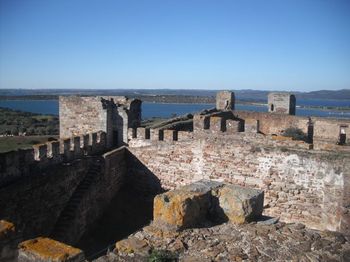
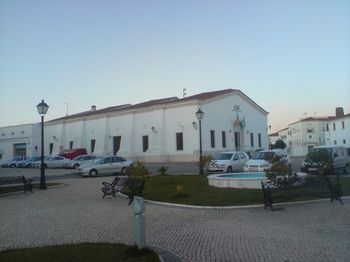
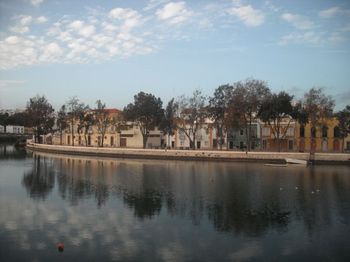
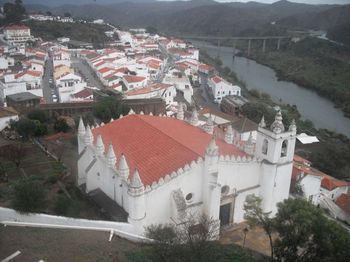
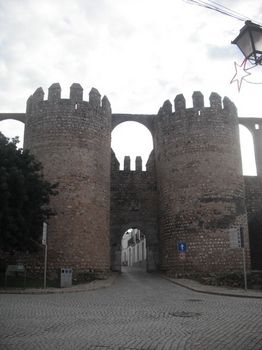
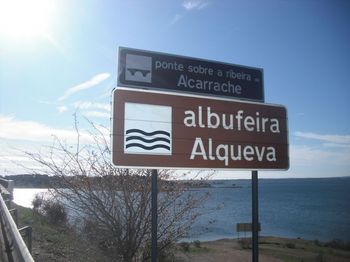
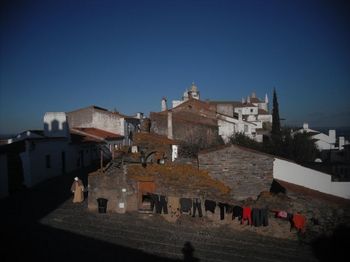
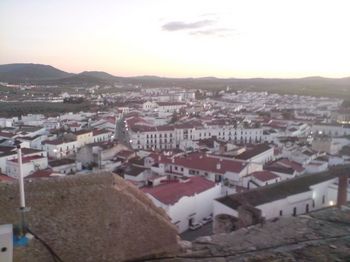
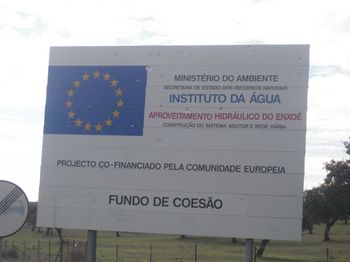
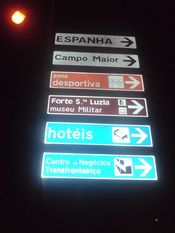
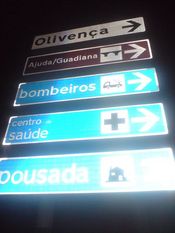




Michael, I guess your travelling is also linked to the type of work/financial lifestyle you lead, and I admire how you have grabbed your opportunities with both hands to see the big old world out there.
And of course, every time you travel, it keeps the planet warm. Thank goodness.
Pitty you didn’t spent at least a day in fortified Elvas. It was under siege a couple times.There is an English cemitery there from Battle of Albueira, maybe the oldest in Europe also a small Military Museum in Santa Luzia Fortress. You would have loved it’s fortifications – not only medieval castles but napoleonic era baluartes and Santa Luzia and Graça Fortress . You can clearely see the whole fortified city and external fortress in Google maps.
luckylucky: However much time you have, you will always run out of time and miss out on seeing things. Sometimes all you do on a first trip to a place is figure out what there is to see. Just driving through Elvas in the evening, it was obvious that here was a place I could easily spend a fair bit of time, but I had a flight to catch. And I wanted to visit Badajoz, but no time. And the place in the region that gets the most superlatives is Évora, but all I could do there was speed past on the motorway. It was very frustrating to instead have to waste eight hours in an airport the next day.
There is often a next time, though. I haven’t been to Lisbon since 1993. I must go there again soon, and combine it with at least a couple of days in the interior.
Michael it wasn’t my intention that being read as a critique towards you. It was more as a lament of the fate in your travel.
Btw i have found the cemitery have an online place http://british-cemetery-elvas.org/
Now after reading this I have an attack of saudade.
And behind my window snow is coming down something fierce…
You describe it beautifully, Michael; I envy your ability to travel well.
PS
Don’t know if the story with Soviet soldiers playing with skull of the general von Bluher is true, but if you go Evora, brace yourself for a site of thousands of skulls fashioned into walls and arches. I don’t know what is more barbarian…probably the latter: it was not on a spur of the moment, collected over the centuries and considered a righteous and very Christian thing to do…
luckylucky: I wasn’t taking it as a critique. You simply found my own (already existing) wistful regret at having missed seeing some interesting and beautiful things.
Okay Michael 🙂
Tatyana this link explains it:
http://en.wikipedia.org/wiki/Capela_dos_Ossos
“We bones here, for yours await”
Damn, man. Nicely done. The trip and the write-up.
Thanks, luckylucky; no explanations necessary. I was on excursion there and heard all possible explanations.
It’s still barbaric and creepy.
A bit too much for me to read just now, but skimming through I noticed this in reference to the possibility of a car accident:
“…a relatively routine traffic matter…”
Surely you meant something like “trivial”? At least I’d hope car accidents aren’t a regular enough experience for you to think of them as “routine”..
You never mentioned the Lines of the Torres Vedras, without which Wellington’s eventually would have been impossible.
…correction to above post. Should read ..”eventual victory…
Thank you for writing that up for Samizdata Michael – I enjoyed reading through it properly this time. One of the things you convey well is that sense of excitement peculiar to traveling despite the lack of any unusual or dramatic things happening.
Quick questions on the camera: which model were you using? And couldn’t you re-charge the battery overnight?
“The lack of obvious preparation for tourists emphasized a particular point. Although a huge number of foreigners visit the beaches of the Algarve, the inland of Portugal is off the international tourist trail. I find this puzzling, as this is wonderful country, and the reception one receives in it is as warm and welcoming as I have ever found anywhere.”
I am puzzled that you find it puzzling – in my experience, the curiosity necessary to traveling through places lacking obvious attractions (e.g. beaches, nightlife, famous mountain etc) is an uncommon thing.
“Often, the people who run such museums miss the wood from the trees. In a place that something truly earthshattering once happened, a small corner will be devoted to the earthshattering thing, and the rest of the museum will be filled with humdrum relics from 1920, which are no different from relics from 1920 anywhere else.”
Hm, either that or there will be some skewed emphasis of an historical event with nationalistic tones at the expense of other perhaps more interesting things like a peculiar engineering achievement or opening of a new international trading route. Or there will be much rhapsodizing over the architectural wonder of a cathedral with only a footnote acknowledgement of the wanton massacre which preceded its’ construction.
“An archaeological dig showing amazing Roman ruins, including those of a beautiful portico, no doubt a very painful spot.”
Why would a portico be somehow painful??
I broke my hard extremely badly last year, and as a consequence I stopped carrying around my digital SLR, and since then I have been carrying an extremely lightweight point and shoot most of the time – a Fuji J-20. This is lacking in low light performance compared to the SLR, and has relatively poor battery life. Yes, I recharge it overnight, but I can still find myself without enough power after a day of heavy shooting. (The nice thing about my Pentax D-SLR was that it takes standard AA batteries. Therefore I can carry several sets of rechargeables, and in the worst case I can simply buy a set of non-rechargeable batteries and keep photographing).
Beaches don’t do it for me when I am traveling, or indeed at any other time. This is perhaps because I grew up next to a really nice one, or just that I don’t have the personality for them. Nightlife I can enjoy, but it is not something I really need to travel for. So I go for “travel broadens the mind”, which is a saying for a reason. I guess you are right. Most travelers go to the same places as one another. Maybe they are going for the fame of the places or for the social experience of visiting them rather than the places themselves.
As for your final question, the Canadian comedy duo Wayne and Shuster did a comedy sketch set in ancient Rome called “Rinse the Blood of My Toga”. (There are several recorded versions of this – a TV version and several radio and record versions, so they are not all quite the same). This contained the joke
“He was stabbed…. in the portico”
“Ouchhh. That’s a very painful spot. Even more painful than the rotunday”. (Somebody earlier in the sketch had been killed while visiting a rotunda).
My allusion to this joke may have been too obscure, alas. However, having heard this sketch a few times in my childhood, my immediate reaction to seeing a Roman portico pointed out is “Ohh. That’s a very painful spot”.
Take a back up battery for the little Fuji until your hand gets better. I took my DSLR with me to Taipei recently but didn’t get much done with it because of the awful weather (which got better as we were about to head home, naturally) and because of the prohibitions on photography inside the buildings we visited. The opposite frustration to yours.
“…having heard this sketch a few times in my childhood, my immediate reaction to seeing a Roman portico pointed out is “Ohh. That’s a very painful spot.”
Mm, well each to their own – I can’t look at a private registration plate on a car without thinking of this. Two blokes on a football website had been arguing about the merits of private plates until one of them made that bit of hilarity.
Damn you, Jennings; damn you to hell. Now I have to go back to Portugal (I’ve only ever been to the Algarve), and it’s all your fault. I’m going to make a formal complaint, to someone.
Excellent post.
nice article.
I have been developing a… well ‘plan’ is too grand a word… ‘whim’ perhaps…. to spend the next five years occasionally attending 200th anniversaries of slected Napoleonic battles. Not all of them (!), starting perhaps with Fuengirola (an unusal british v polish confrontation in 1810) and eventually ending up at Waterloo in 2015, by way of Salamanca, Borodino… etc.
your post inspres me to turn the whim into a plan.
If anyone else happens to be planning anything similar and would fancy sharing a litre of wine in strange bars from time to time over next five years.. email me at gmail.com
I am generally on for drinking wine in strange bars in places a little of the beaten track. Bonaparte got around though. There will be bars where one should really be driking beer or even vodka.
I am apreciating it very much.I have never read such a lovely article and I am coming back tomorrow to continue reading.
oakley Sunglasses